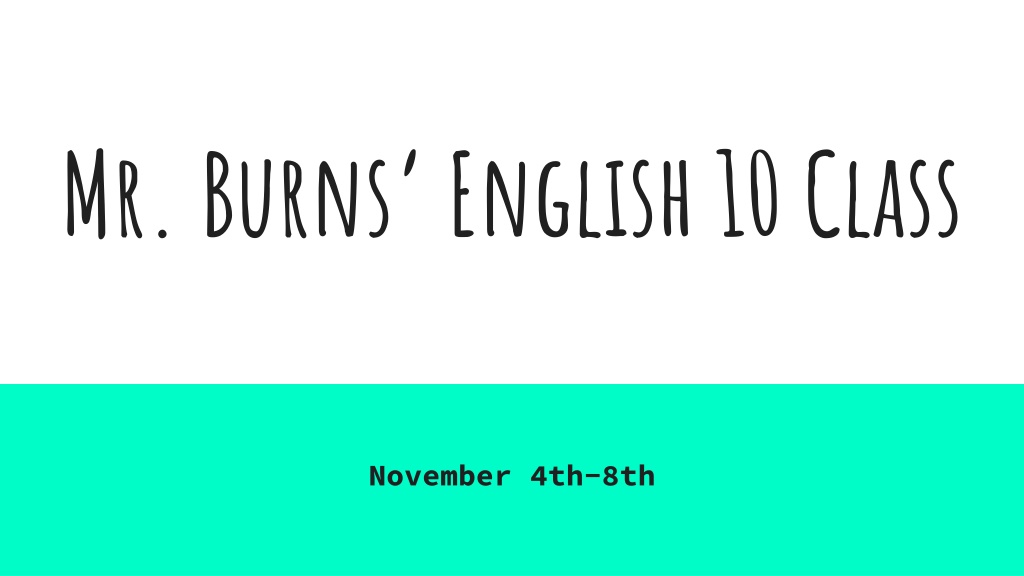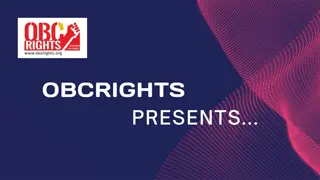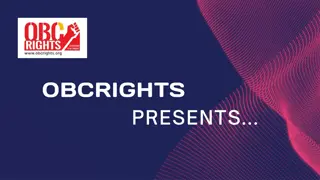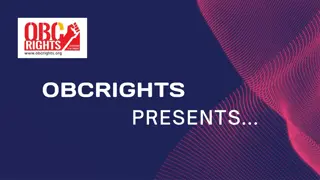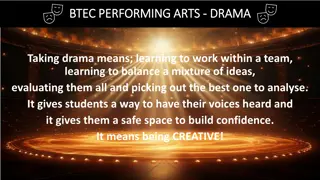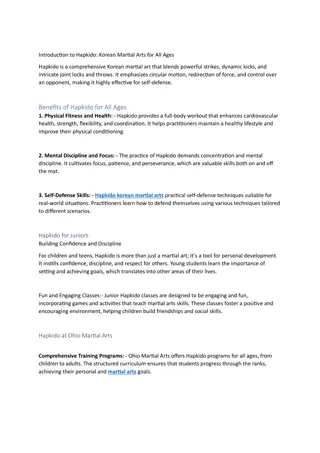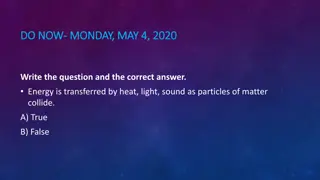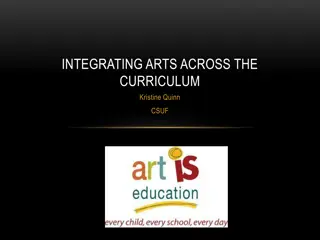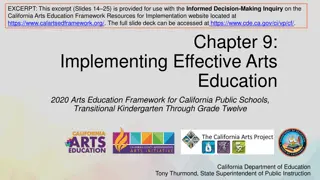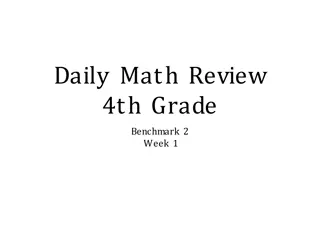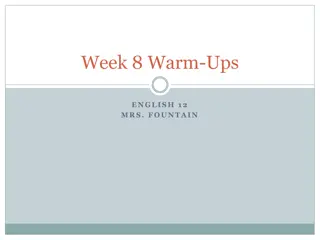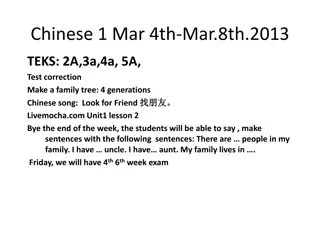Language Arts Class - Week of November 4th-8th
In this week's English class, students explore prepositions, infinitives, appositives, and participials. They also learn about active and passive voice and practice using active voice in their writing. The content includes a thought-provoking question for discussion and an assignment related to applying learned concepts.
Download Presentation

Please find below an Image/Link to download the presentation.
The content on the website is provided AS IS for your information and personal use only. It may not be sold, licensed, or shared on other websites without obtaining consent from the author.If you encounter any issues during the download, it is possible that the publisher has removed the file from their server.
You are allowed to download the files provided on this website for personal or commercial use, subject to the condition that they are used lawfully. All files are the property of their respective owners.
The content on the website is provided AS IS for your information and personal use only. It may not be sold, licensed, or shared on other websites without obtaining consent from the author.
E N D
Presentation Transcript
Mr. Burns English 10 Class November 4th-8th
Monday, November 4th, 2019 Question of the Week: Do you want to be a product of your time or do you want to be a reformer of your time? Why? Please write the date in your composition book. Please write in complete sentences.
Prepositions, Infinitives, Appositives, and Participials What is a preposition? A preposition is a word usually preceding a noun or pronoun and expressing a relation to another word or element in the clause. What is an infinitive? An infinitive is the verb in its basic form. The infinitive form of a verb is usually preceded by to, but not always. What is an appositive? An appositive is a noun or a noun phrase that is next to another noun to rename it or to describe it in another way. What is a participial? A participial is a word formed from a verb which can be used as an adjective.
What is active voice? What is Passive Voice? What is active voice? In the active voice, the subject always does the action of the sentence. Chronologically, the subject will come before the verb in the sentence. Mr. Burns reads to his class. What is passive voice? The passive writing voice occurs when something that is ordinarily done by the subject of a sentence is done by the object of a sentence. The reading was completed by Mr. Burns.
Use active voice The active voice is usually more direct and vigorous than the passive voice. I shall always remember my first visit to Boston. This is much better than My first visit to Boston will always be remembered by me. The latter sentence is less direct, less bold, and less concise. If the writer tries to make it more concise by omitting by me, My first visit to Boston will always be remembered, it becomes indefinite/vague/confusing: is it the writer, or some person undisclosed, or the world at large, that will always remember this visit?
Do not use passive voice--only when necessary It s better to use active voice, but the writer should not entirely discard the passive voice, which is frequently convenient and sometimes necessary. The dramatists of the Restoration are little esteemed to-day. Modern readers have little esteem for the dramatists of the Restoration. The first would be the right form in a paragraph on the dramatists of the Restoration; the second, in a paragraph on the tastes of modern readers. The need of making a particular word the subject of the sentence will often, as in these examples, determine which voice is to be used.
The Fall of the House of Usher Finish the Gothic Tale (page 29 paragraph 40) No cell phones Yield to the text!
The Fall of the House of Usher Written-Response Question Was this really about a man burying his sister alive? What might give it the impression this is really not about a man burying his sister alive? Use the authority of the text to respond to the question.
The Fall of the House of Usher Short Animated Film The Fall of the House of Usher animated with subtitles Edgar Allan Poe Read by Christopher Lee
Tuesday, November 5th, 2019 Bell-work: Write one sentence correctly using active voice using the following words (you may include other words as well): Brabbled: to argue loudly about matters of no importance Ominous: warning of evil or harm Daley: tall, skinny, shaggy dirty blonde haired poet Rider: wears a moon earring because he s cosmic
What is active voice? What is Passive Voice? What is active voice? In the active voice, the subject always does the action of the sentence. Chronologically, the subject will come before the verb in the sentence. Mr. Burns reads to his class. What is passive voice? The passive writing voice occurs when something that is ordinarily done by the subject of a sentence is done by the object of a sentence. The reading was completed by Mr. Burns.
The Fall of the House of Usher Short Animated Film The Fall of the House of Usher animated with subtitles Edgar Allan Poe Read by Christopher Lee
Annotated Bibliography Student Example Follow along as I read the student example. On the student example, write what you think should be included in the Annotated Bibliography based on the student example.
Wednesday/Thursday, November 6th/7th, 2019 Bell-work: Students will work on the Growing Roots worksheet for the root word (prefix) omni. Omni: everywhere, all Section 3: The word you will breakdown is omnipotent, which means having unlimited power; able to do anything. 15-minutes to complete
What is active voice? What is Passive Voice? What is active voice? In the active voice, the subject always does the action of the sentence. Chronologically, the subject will come before the verb in the sentence. Mr. Burns reads to his class. What is passive voice? The passive writing voice occurs when something that is ordinarily done by the subject of a sentence is done by the object of a sentence. The reading was completed by Mr. Burns.
Show me How Well you can Identify Active and Passive 1. The kicker missed the extra point after the touchdown. 2. In 1837, Nathaniel Hawthorne collected a number of stories that he had written for the gift book market and published them to great critical acclaim as Twice Told Tales. 3. Several people were arrested by police. 4. The wheat crop was ruined by a sudden storm. Number 1-4 and then write Passive or Active in your composition book.
Annotated Bibliography Student Example An annotated bibliography is a bibliography that gives a summary of each of the entries.The purpose of annotations is to provide the reader with a summary and an evaluation of the source. Each summary should be a concise exposition of the source's central idea(s) and give the reader a general idea of the source's content. Types of annotated bibliographies: Informative, Evaluative, and Combination.
Advice for Writers Assume Judas and the worst teacher you ve had are two OF YOUR READERS. In doing so, you will simply have to temper the generic back-patting with some degree of common sense, exhortation (urging someone to do something), and qualification. How are you going to passionately persuade and passionately inform Judas and your worst teacher?
Pre-Writing Brainstorming Lists What needs to be addressed in the annotated bibliography? See example on the whiteboard 1st Draft Pencil and Paper Write Students will write two paragraphs for one of their sources.
Annotated Bibliography Work Day (2nd Source) Format: 1. Citation: Rummelsburg, Steven Jonathan, et al. Of Apples and Arsenic: Classical vs. Progressive Education ~ The Imaginative Conservative. The Imaginative Conservative, 26 Sept. 2019, theimaginativeconservative.org/2019/09/apples-arsenic-classical-progressive-education- steven-jonathan-rummelsburg-sebastian-damico.html. 2. Paragraph 1: Summarize the following ideas from the source: the author s claim; how the author supported their claim; the author s purpose; the author s tone; the intended audience; and the source s importance. 3. Paragraph 2: Answer the following question: Why did you think the source was useful or not useful? Explain how reliable or unreliable it was;how you can use the source; how it changed or did not change your mind; and do you still believe in your topic?
Product or Reformer Hello, my name is Mr. Burns and I am a millennial. The stereotypes associated with being a millennial are true. For instance, in the book Generation Me by Jean Twenge she describes millennials as introverts, narcissistic and entitled. I am a product of my generation because I all of those characteristics. I m not civic minded person because I am narcissistic. Since I am narcissistic, I like to be alone. As a result, I believe I am entitled to my private time or my Me time . All of these characteristics were due to my Baby Boomer parents. There I go again being narcissistic and blaming a group for my problems! Millennials believed we should have earned 6-figures after graduation without deserving it. Millennials believed that we didn t need to work for anything and it would all be given to us. Well guess what? It never happened! Most of us, but not all are in debt barely getting by as Baby Boomers count their gold. Secretly I have become a reformer because while people in my generations were working and staying single--I married and my wife and I bore a child. We didn t decide to be a childless couple and travel the world because that s what narcissistic individuals do. I reformed because I appreciate classicism and become fond of truth, beauty, and goodness. Finally, I rather look to the past than succumb to the downfalls of modernism. Thanks Boomers!
